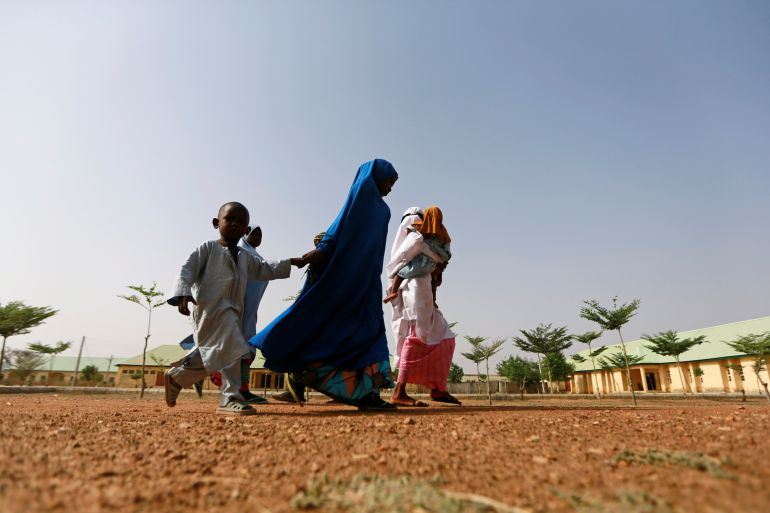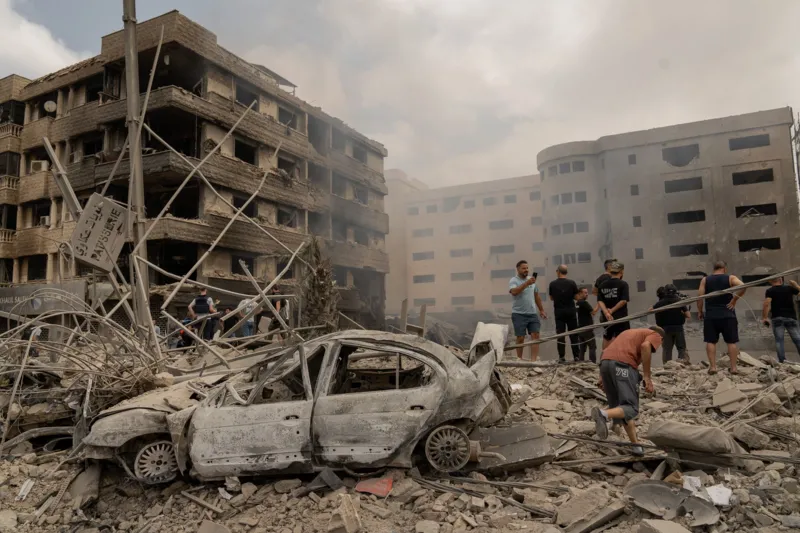Why mass kidnappings still plague Nigeria a decade after Chibok abductions
Nigeria, with one of the strongest armies in the region, is struggling to tackle rising insecurity that puts vulnerable groups at risk.

In the decade since the armed group Boko Haram kidnapped nearly 300 students at an all-girls school in the town of Chibok, abductions have become a recurrent fixture in Nigeria, especially in the restive northern regions.
Just last month, on March 7, a criminal gang kidnapped 287 pupils at the government secondary school in Kuriga, a town in Kaduna state. Two days later, another armed group broke into the dorm of a boarding school in Gidan Bakuso, Sokoto state, kidnapping 17 students.
The Sokoto victims and more than 130 of the victims from Kaduna have since been released, but there is no word yet about the remaining abductees.
Meanwhile, out of the hundreds taken in Chibok in April 2014, more than 90 are still missing, according to the United Nations children’s agency, UNICEF.
“I cannot believe that it is 10 years and we have not really done anything about [stopping] it,” said Aisha Yesufu, the co-convener of the #BringBackOurGirls movement pressing for the release of the kidnapped Chibok students.
Nigeria is plagued by insecurity. In the northeast, Boko Haram has waged a violent insurgency since 2009; in the north-central region clashes between farmers and herders have escalated in recent years; and acts of banditry by gunmen in the northwest are terrorising citizens.
Across the country, the targeting of vulnerable populations has been widespread, including kidnappings for ransom or to pressure the government to meet the aggressors’ demands. Experts also say that worsening economic conditions have led to an increase in abductions for ransom over the last four years.
But as Africa’s largest economy and a country with one of the strongest military forces on the continent, many have questioned why Nigeria has been unable to nip the spiralling insecurity crisis in the bud.
“At the end of the day, it comes down to the fact that there is no political will,” Yesufu said.
A booming industry
Last year, charity Save The Children reported that more than 1,680 students have been abducted in Nigeria since 2014. This has significantly contributed to deteriorating absentee statistics, with one in three Nigerian children not in school according to UNICEF.
But students are not the only ones bearing the burden of the crisis as travellers, businesspeople, priests, and those perceived as being well-off are also often targets. Kidnappings have become a sub-economy of sorts, as abductors rake in millions of naira in ransom payments. Social media is also littered with public requests from people soliciting funds to buy the freedom of their abducted relatives and friends.
Since 2019, there have been 735 mass abductions in Nigeria, according to socio-political risk consultancy firm, SBM Intelligence. It said between July 2022 and June 2023, 3,620 people were abducted in 582 kidnapping cases with about 5 billion naira ($3,878,390) paid in ransoms.
This year alone SBM Intelligence said there have already been 68 mass abductions.
The abductions are not confined to the north, where banditry and armed religious groups are prevalent, but have also been seen in the south and the southeast. Even Abuja, Nigeria’s capital territory, has not been spared, and in Emure Ekiti in the relatively peaceful southwest region, five students, three teachers and a driver were kidnapped on January 29.
The roots of hostage-taking in Nigeria can be traced back to the 1990s in the Niger Delta, where the country gets most of its oil; at the time, armed groups started abducting foreign oil executives as a way to pressure the government to address their concerns about oil pollution in their communities.
But in recent times, hostage-taking has become a booming industry, said Olajumoke (Jumo) Ayandele, Nigeria’s senior adviser at the Armed Conflict Location and Event Data Project (ACLED). Perpetrators now mostly target socially classified vulnerable groups such as children and women, she said, to elicit public anger and press their demands for ransom payments or the release of their arrested gang members.
When a ransom is demanded, the payment is expected to be made by the victims’ relatives, or in some cases the government – and delays or non-payment can sometimes be deadly. One of five sisters kidnapped in Abuja in January was brutally killed after a ransom deadline passed, sparking a national outcry.
“The groups that have used this strategy are able to gain local and international attention to really show their strength and amplify what they want to state authorities,” Ayandele told Al Jazeera.
Although the Nigerian government has said it does not negotiate with terrorists in dealing with the spiralling security crisis, experts say this may not be true.
“We have heard and we have seen some state governments negotiating with some of these groups and some of these bandits,” said Ayandele. In many cases, this has only emboldened the criminals.
Why can’t Nigeria stop the abduction of pupils?
Experts say that complex, multilayered issues are at the heart of the worsening insecurity crisis. These include socioeconomic factors, corruption and a lack of cohesiveness in the security structure – where there is no rapid response to attacks and ineffective collaboration between the police and the military.
Over the last decade, Nigeria’s economic situation has all but nosedived as the country grapples with high inflation, rising youth unemployment, and the loss of currency valuation. The fortunes of citizens have hardly improved, and 63 percent of people are in multidimensional poverty. Experts say this has pushed many into criminality.
“The economic hardship during this period has only increased and different policies drive different dimensions. As a result, this has led to kidnapping being seen as a viable and profitable endeavour,” said Afolabi Adekaiyaoja, a research analyst at the Abuja-based Centre for Democracy and Development.
The security architecture in Nigeria is also centralised, with authority concentrated in the hands of the federal government and no real state or regional policing independent of that. Experts say this has hindered the ease with which security agents can operate. It has also led to calls for state policing, especially amid criticisms that security agencies do not collaborate effectively.
At an army level, soldiers have complained about low remuneration and substandard weapons. The Nigerian military has been dogged with accusations of corruption, sabotage, connivance and brutality in the past, and this has fractured relationships with communities and potential sources of intelligence.
“This inability is not down to the military alone – there is a cross-government failing in security response,” Adekaiyaoja told Al Jazeera.
“There needs to be a stronger synergy in communal buy-in in securing facilities and also escalating necessary intelligence … There should be a renewed focus on necessary and frankly overdue police reform and a stronger synergy between intelligence and security agencies.”
Nigeria’s insecurity plagues all six of the country’s geopolitical zones, with each facing one or more of the following: armed fighters, farmer-herder clashes, bandits or unknown gunmen, Indigenous People of Biafra (IPOB) separatists, oil bunkering and piracy. This has kept the armed forces busy.
“Our security forces are spread thin. We have six geopolitical zones in Nigeria and there is something that is always happening,” said ACLED’s Ayandele.
Abduction victims who have been released have reported harrowing conditions while in captivity. They are often threatened with death and barely fed as they endure unhygienic, unsavoury living conditions, including sleeping out in the open and trekking long distances into forests where they are kept.
The girls especially are vulnerable to rape and even forced marriages. Adults’ testimonies claim they are routinely beaten and tortured until the captors’ demands have been met.
Experts say the experiences leave victims with serious psychological wounds and trauma.
The fear of their children being abducted has led many parents in hot zones in the northeast and northwest to pull their children out of school entirely to avoid the risk. This is despite the government’s introduction of free and compulsory basic education in schools.
According to UNICEF, 66 percent of all out-of-school children in Nigeria are from the northeast and northwest, which also represent the poorest regions in the country.
“No parent should be put in a situation where they have to make a choice between the lives of their children and getting their children educated,” said #BringBackOurGirls movement’s Yesufu, adding that education is under attack in Nigeria.
As a result, she said illiteracy is then weaponised by the political class, who use people’s lack of information and knowledge to manipulate voters during elections.
But for some girls, the consequences may be even more dire than just losing an education, Yesufu said, as some parents decide to marry their daughters off early to avoid them getting kidnapped or worse. More than half of the girls in Nigeria are currently not attending school at a basic level, and 48 percent of that figure are from the northeast and northwest.
Education is crucial to national growth and development. But Nigeria’s continuing abduction crisis is posing serious challenges to schooling in the worst-affected regions of the northeast and northwest – and experts worry it may have broader implications for the country in the near future.
“This is just a ticking time bomb because when you don’t have a populace that is educated, they can be easily radicalised or recruited into these non-state armed groups,” Ayandele said.
“We don’t know what can happen in the next 20 years if we don’t address this education problem as soon as possible.”
-al jazeera







